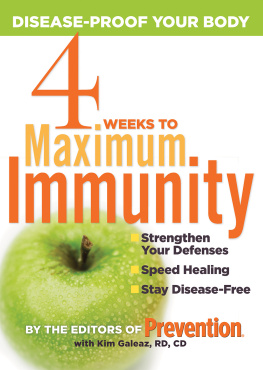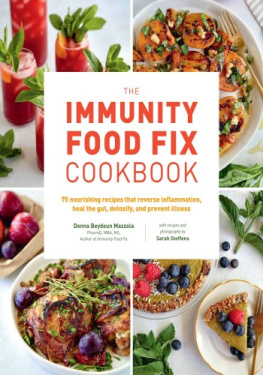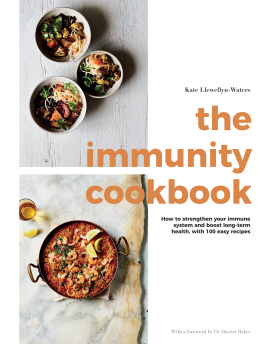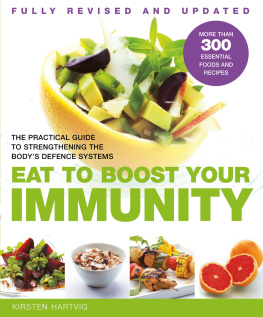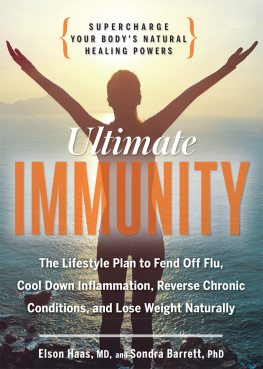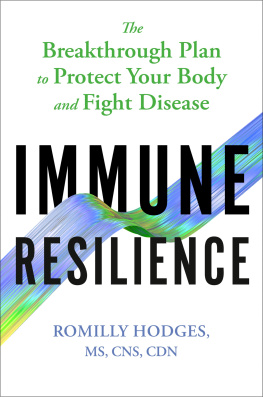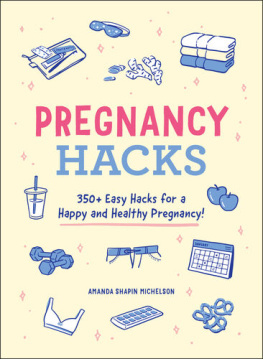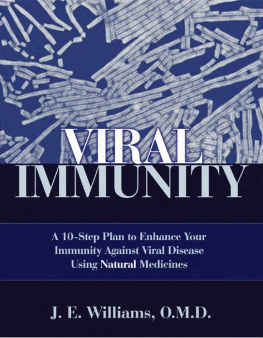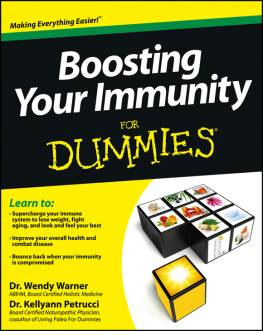

Notice
This book is intended as a reference volume only, not as a medical manual. The information given here is designed to help you make informed decisions about your health. It is not intended as a substitute for any treatment that may have been prescribed by your doctor. If you suspect that you have a medical problem, we urge you to seek competent medical help.
Mention of specific companies, organizations, or authorities in this book does not imply endorsement by the author or publisher, nor does mention of specific companies, organizations, or authorities imply that they endorse this book, its author, or the publisher.
Internet addresses and telephone numbers given in this book were accurate
at the time it went to press.
2008 by Rodale Inc.
Direct edition was published as Preventions Maximum Immunity in 2007. Trade edition published in 2008.
All rights reserved. No part of this publication may be reproduced or transmitted in any form or by any means, electronic or mechanical, including photocopying, recording, or any other information storage and retrieval system, without the written permission of the publisher.
Rodale books may be purchased for business or promotional use or for special sales. For information, please write to: Special Markets Department, Rodale Inc., 733 Third Avenue,
New York, NY 10017
Prevention is a registered trademark of Rodale Inc.
Interior design by Tara Long
Cover design by Susan Eugster
Front cover photo Stockbyte/Getty Images
Contributing writers: Rick Ansorge, Elizabeth Shimer Bowers, Jennifer Bright Reich, Julia VanTine-Reichardt
Library of Congress Cataloging-in-Publication Data is on file with the publisher.
ISBN-13 9781594867118 paperback
ISBN-10 1594867119 paperback
ISBN-9781605299686 ebook

Contents
PART I
Meet Your Immune System

Your Best Ally against Illness

Compared to the deadly hot zone viruses such as Ebola and Lassanow confined to continents half a world awaythe influenza viruses that arrive here each winter seem tame. After all, theres a flu vaccine available, and most people have some immunity.
But seasonal flu is dangerous. Each year, about 36,000 Americans die from it or its complications. Its also possible that an entirely new influenza virus will emergeone for which humans have no immunityunleashing a worldwide outbreak, or pandemic. The world hasnt seen an influenza pandemic since 1968, and more than a few scientists believe that were overdue. Its potential cause: a strain of flu that typically infects only birds.
This avian (bird) strain of influenza, named H5N1, first spread from bird to human in 1997. As of this writing, H5N1 has killed less than 200 people worldwide. But if the virus learns to spread from human to human, it could ignite the worlds next plague.
Scientists have reason for concern. In 2005, a team of researchers re-created the 1918 Spanish influenza virus, which killed between 20 million and 50 million people around the globe. The team discovered that the Spanish flu strain had started out as an avian influenza virus that eventually learned to infect humans.
The Spanish fluwhich killed more people in 6 months than AIDS has in 25 yearsisnt the only threat. Biological weapons such as smallpox, botulism, and plague could be unleashed. Lethal viruses flare and disappear, only to flare again. Hantavirus, which broke out in the Southwest in 1993, recently re-erupted in Washington and Colorado. HIV (human immunodeficiency virus), which causes AIDS, continues to kill.
Currently, no vaccines exist for any of these threats. What, then, is our best defense?
A strong immune system.
Scientists often compare the immune systemthe bodys elegant and complex mechanism of defenseto an army. Its two trillion cells are organized into separate but integrated divisions of organs, tissues, and special cells that share a common mission: to defend their country (thats you). And like an army, the immune system attacks foreign invaders that threaten its security, including illness-causing viruses and bacteria, icky fungi, and even cancer cells. But it lives in peace with the good bacteria that inhabit the gut and other organs.
The protection our immune systems afford us in part depends on genetics, but a lot rides on how well we care for ourselves. Theres no question that a healthy lifestyle benefits the immune system, says Michael Zasloff, MD, an immunologist and professor in the departments of surgery and pediatrics at Georgetown University Medical Center in Washington, DC. Terry Phillips, PhD, an immunochemist in the division of bioengineering and physical science at the National Institutes of Health, agrees. If you have good health and your immune system is doing its job, the best way to keep it healthy is to do all the things that keep it naturally strong, like exercising, eating right, and coping with stress as best you can, he says.
That means that regardless of your genetics and current health, you can power up your immune systems ability to fight illness and speed healing. This book shows you how.
Bird Flu: Prepare, Dont Panic
TV movies about a global outbreak of bird flu portray doomsday scenariosmandatory quarantines, emergency rooms overrun with panicked citizens, mass burials. But pandemic doesnt necessarily equal plague, and its important to separate fact from fiction.
First, the facts: Avian influenza is caused by influenza viruses that typically strike birds and poultry. In 1997, one strain of the virus, H5N1, began to infect humans. In the current outbreaks, occurring in Asia and parts of Europe, the Near East, and Africa, more than half of those infected with H5N1many previously healthy children and young adultshave died. Most cases resulted from contact with infected birds, mostly chickens, turkeys, and ducks raised for food.
Having never been exposed to the H5N1 virus, we have no immunity to it, explains bird-flu expert William Schaffner, MD, of Vanderbilt University School of Medicine in Nashville. So far, the virus virtually always spreads from birds to people. But some experts believe that H5N1 may acquire the ability to jump from human to human, igniting a pandemic. On the other hand, the changes required for the virus to spread among people could make it less dangerous than the current strain.
Theres no way to know if a pandemic will strike, says Dr. Schaffner. But if it does, it will most likely begin in Asia, arriving in the United States within a few weeks. Local, state, and federal governments have begun to formulate plans for dealing with a pandemic. The federal Web site www.pandemicflu.gov offers guidelines on how families and communities can prepare. One suggestion: Stockpile a 2-week supply of food, water, and necessary prescription medications.
While even the strongest immune system cant protect against bird flu, good hygiene habits can help prevent its spread. Get into the practice of washing your hands frequently with soap and covering your coughs and sneezes with your inner arm rather than your hand. Teach your family to do the same.
Next page
